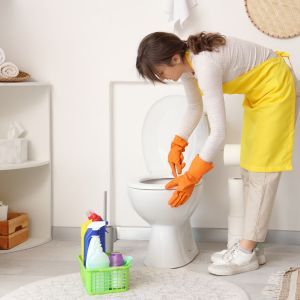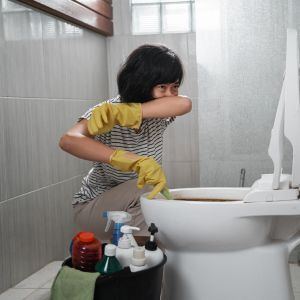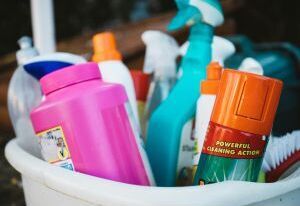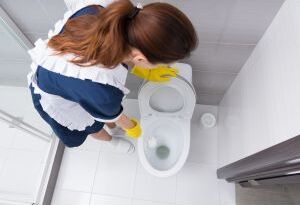5 Enzyme Cleaner Mistakes That Make Smelly Toilets Worse in Commercial Bathrooms
Persistent odours in commercial toilets are a common issue, and one that can damage your business's image. While you might be cleaning regularly, lingering smells often stem from subtle missteps—especially when it comes to how enzyme-based toilet cleaners are used. Enzymes are powerful allies in eliminating odour, but only when applied correctly.
This blog explores 5 common mistakes businesses make with enzyme toilet cleaners and how to fix them to maintain a fresh, hygienic bathroom environment.
If you're looking to understand more about how enzymes work in cleaning, check out our related article: Enzymes in Drain Cleaning: What They Are, How They Work, and Why NZ Workplaces Should Use Them. It provides a deeper dive into the science behind enzyme action and why it's essential for commercial hygiene.
1. Inconsistent Use of Enzyme Cleaners
Mistake: Only using enzyme cleaners occasionally or skipping key areas like under the rim, drains, or behind fixtures.
Why it worsens odour: Enzymes need consistency to break down organic waste effectively. Sporadic use limits their full odour-fighting potential.
Fix / Best practice:
-
Incorporate enzyme toilet cleaners into your daily cleaning routine.
-
Focus on key odour zones: toilet bowls, urinal traps, flush rims, and drain openings.
-
Use a product-specific checklist to ensure thorough coverage.
2. Using Enzymes with Incompatible Products
Mistake: Mixing enzyme cleaners with harsh chemicals like bleach or acidic disinfectants.
Why it worsens odour: These chemicals kill the beneficial enzymes, rendering the cleaner ineffective and allowing odours to return quickly.
Fix / Best practice:
-
Use dedicated enzyme-based cleaners first, followed by a rinse if using a disinfectant.
-
Avoid mixing products during the same clean.
-
Ensure staff are trained in product compatibility.
3. Ignoring the Contact Time Required
Mistake: Rinsing or wiping off enzyme cleaners too quickly.
Why it worsens odour: Enzymes require time to break down biofilms and organic matter. Cutting this short reduces effectiveness.
Fix / Best practice:
-
Allow sufficient dwell time (as per the label) before rinsing or wiping.
-
Let enzyme-based products work overnight in drains or urinals when possible.
-
Consider using slow-dissolving enzyme blocks for continuous treatment.
4. Overlooking Enzyme Maintenance in Floor Drains & Urinals
Mistake: Treating only the visible surfaces and neglecting deeper sources of odour like urinal traps and floor drains.
Why it worsens odour: Organic build-up in plumbing is a major source of smell and needs targeted enzyme application to be neutralised.
Fix / Best practice:
-
Flush enzyme-based drain cleaner through all urinals and floor drains weekly.
-
Use urinal enzyme tablets to maintain freshness.
-
Schedule routine maintenance cleans with enzyme pipe products.
5. Choosing the Wrong Type of Enzyme Cleaner
Mistake: Using a general-purpose or fragranced cleaner with no proven enzyme action for bathroom cleaning.
Why it worsens odour: Without active enzymes, you’re just masking smells instead of breaking down the actual cause.
Fix / Best practice:
-
Select commercial-grade enzyme toilet cleaners specifically formulated for organic waste.
-
Look for products with verified enzyme strains and odour-neutralising technology.
-
Avoid relying solely on air fresheners or deodorisers.
Summary & Quick Checklist
| Mistake | Why It Worsens Odour | Solution |
| Inconsistent enzyme use | Limited odour breakdown | Daily enzyme cleaning routine |
| Mixing with harsh chemicals | Enzyme activity destroyed | Separate chemical and enzyme use |
| Rushing dwell time | Enzymes can’t do their job | Allow proper contact time |
| Ignoring hidden sources | Odour builds in pipes | Enzyme drain/urinal treatments |
| Wrong cleaner type | Just masks smell | Use targeted enzyme products |
By correcting these enzyme cleaner mistakes, your business can maintain a consistently fresh and professional toilet environment—improving both hygiene and customer perception.
FAQ
Q: Can I use bleach with an enzyme toilet cleaner?
A: No. Bleach kills the active enzymes. Use them separately with a rinse in between.
Q: How often should I use enzyme cleaners in commercial toilets?
A: Ideally, daily—especially in high-traffic areas. Weekly for deep treatments like urinals and floor drains.
Q: Are enzyme cleaners safe for all plumbing?
A: Yes. Enzyme cleaners are generally safe for all commercial plumbing and septic systems.
Q: Do enzyme cleaners remove the smell or just mask it?
A: They remove odour at the source by breaking down the organic matter causing it.
Need the right enzyme cleaners for your business?
Explore Insinc’s enzyme-based cleaning range to help your workplace stay fresh, hygienic, and professional every day.
Posted: Monday 13 October 2025




